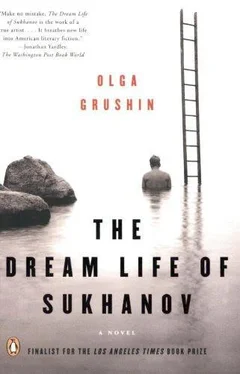Sukhanov sat back in his chair.
“Vasily said that?” he asked slowly.
Pugovichkin shrugged. “I think his exact words were ‘with the old man.’ Frankly, at the time I was rather perplexed that you hadn’t mentioned your vacation. I gather you changed your mind about it? In any case, since none of us ever heard back from you, we assumed you’d received the word, agreed to the whole thing, and gone off to the sea with your son. Did he not give you my message?”
Forcing his scattering thoughts to order, Sukhanov recalled the unbearable Tuesday morning he had spent working on the article, with Vasily sulking behind his closed door and the remote telephone ringing intermittently throughout the sluggish, torturous hours. The boy had been angry with him about his failure to convey the Minister’s invitation to a party, he remembered. It suddenly seemed like an event from a very long time ago.
“The issue won’t go to print without my complete approval, and that’s that,” he said in his most formal tone. “Kindly stop the presses and get someone to bring me a copy of the article. If I don’t like it, my Dali goes instead. I’m still in charge here unless I’m told otherwise—and unless I’m told by someone directly. Do you understand me, Sergei Nikolaevich?”
Pugovichkin considered him bleakly.
“I understand perfectly, Anatoly Pavlovich,” he said after a pause, “but if you decide to pull it, you’ll be the one to do all the explaining afterward, as it’s bound to make a couple of very important people very unhappy. And whatever you choose to do, you must let me know by Saturday afternoon at the latest. The typesetters are already complaining as it is.”
“Of course,” replied Sukhanov with a brief nod.
Pugovichkin hesitated for a moment, then walked out of the room, shutting the door behind him with pointed precision. Sukhanov remained sitting at his desk, drumming his fingers against its lacquered edge. Initially, his mind was in a whirl, his feelings undistinguished and pained, the very rhythm of his breathing punctuated by small, distressed, wordless cries of disbelief at so much betrayal—betrayal by the trusted Sergei Nikolaevich and all the rest of his colleagues, betrayal by his son, betrayal even by some nebulous influential individual whom he had probably never met but who nonetheless clearly intended to compromise him by forcing on him this impossible choice….
Then, gradually, a dull premonition of dread began to steal over him like an encroaching shadow, suppressing all other thoughts and emotions; but it was not until some minutes later, when a knock so timid it was almost a scratch sounded on his door and Liubov Markovna crept inside after his second “Come in,” her head pulled into her shoulders, a stack of papers in her outstretched hands, that he knew what it was he so absurdly feared—whose name he was so irrationally certain to see on the title page as a reproachful harbinger of his impending downfall. It would be a most fitting conclusion, he thought with the bitter ghost of a smile, to his disquieting slide into the past. “A very Russian name,” Pugovichkin had said—and what name could be more Russian than that of a three-hundred-year-old dynasty of Russian rulers, what man better suited to write about Chagall than one of his own students? It must be, it had to be him—Oleg Romanov, the stern, courageous, maverick painter who almost half a century ago had so painstakingly fine-tuned one boy’s vision in order to render it receptive to the richness of the world.
In the first few years after Anatoly’s return to Moscow, Romanov had sent him frequent letters, with effortless sketches of lacelike dragonflies and demure mermaids scattered between the lines and faintly colored, oil-stained fingerprints on the margins, but Anatoly, numbed by his father’s death, had tossed them indifferently, at times unopened, into a drawer, postponing his answer in expectation of a thaw in his soul, until eventually the one-sided correspondence had tapered off. Later, after he entered the Surikov Institute, his interest in life returned, but he lacked the time needed to compose a sincere, worthy reply—one that would truly explain his silence of the preceding years. Or perhaps, if he was to be completely forthcoming with himself, the time had been there all along, but the path he had chosen, his determination to use the nimbleness of his brush to secure a comfortable livelihood, his constant struggle to squeeze from his manner the last lingering consequences of Romanov’s unorthodox teachings, made him feel vaguely uneasy, dishonest, unclean—a mild enough discomfort, but one that kept him from writing all through his student years, and that proceeded to intensify into a sensation of acute guilt soon after his graduation. Along with a few other promising young artists, Anatoly was appointed to teach at the Moscow Higher Artistic and Technical Institute, the very place from which Romanov had been exiled to Inza in disgrace some two decades before, accused of “undue impressionism” in his works.
With time, Anatoly’s sense of guilt paled, of course, along with the memory of the man who had inspired it, and obscurely he felt the oblivion to which he had consigned his early artistic discoveries to be an essential ingredient—perhaps the basis—of his continuing peace of mind. He led a measured existence, dutifully moving between the quietened Arbat apartment (the elder Morozov, his son Sashka, and the merry construction worker had all perished in the war, and Anatoly had eventually shifted his modest belongings into one of the empty rooms), the auditoriums in which he staunchly repeated the very phrases and gestures that had once made him draw vicious caricatures of the speakers in his student notebooks, and a studio at the institute, where he produced his canvases of grimy, industrious peasants and grimly determined soldiers, with soulful vistas opening behind their broad, sturdy backs. In 1953, when Stalin died, he and his mother grieved along with everyone; he painted a small commemorative portrait for a local school. Nadezhda Sukhanova was proud of him, and appeared content. They were placed on a waiting list to receive their own flat, and at the end of 1954 moved across the city to the Liubianka neighborhood. His works were occasionally purchased by a garment factory or a Young Pioneers club. He had no close friends, but his days were busy enough without them. He was never cynical in his actions (celebrating the people’s accomplishments that had come at such terrible cost was a worthy pursuit, he had no doubt), but simply uninspired and incurious; he had acquired a habit of adjusting to his surroundings with unquestioning acquiescence, and ceased to distinguish between art and craft—a difference of only two letters, after all. By the time he turned twenty-six, he believed he could follow this path into old age, obtaining in due course an amiable wife and two or three children, making a quiet, pleasant, useful way through the world.
And then came the year 1956, and everything he had once held true—all the comfortable ideas and beliefs and ways of life—was swept away. And as the past certainties melted, dizzying drops and hidden false bottoms were revealed in their stead—and in the whirlwind that followed, my soul, which had weathered the intervening years between adolescence and adulthood by retreating deep into its own rainbow-colored world and dreaming secret, fleeting, iridescent dreams of birds and flowers and stars and angels, emerged once again, and was as before, alive and demanding.
Then, awakening abruptly and discovering only emptiness where warmth and friendship should have been, I tried to find Oleg Romanov across the ravages of space and time. But neither repeated letters to the Inza school nor persistent inquiries among colleagues brought any results—the man had moved, the man had vanished, the man had probably died…. And now, three decades later, Anatoly Sukhanov sat in his sun-flooded office on the top floor of the eighteenth-century mansion in the heart of Moscow, trying to calculate how old his teacher would be (only a few years older than his father-in-law, so it was possible), and watching, with irregular heartbeats, Liubov Markovna’s contrite approach.
Читать дальше








![Theresa Cheung - The Dream Dictionary from A to Z [Revised edition] - The Ultimate A–Z to Interpret the Secrets of Your Dreams](/books/692092/theresa-cheung-the-dream-dictionary-from-a-to-z-r-thumb.webp)



